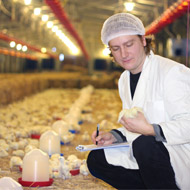Principles to aid understanding of farm assurance schemes

Farm assurance schemes give consumers confidence that their food has been produced to particular standards.
A new policy position to help members of the veterinary profession and public understand farm assurance schemes has been developed by the British Veterinary Association (BVA).
Farm assurance schemes give consumers confidence that their food has been produced to particular standards, such as food safety, animal welfare and the environment. However, the huge variety of schemes available can be confusing - particularly when people are trying to balance ethical and budgetary considerations.
To help shoppers better understand the schemes, the BVA’s policy position sets out seven guiding principles that highlight the role of vets in the health and welfare of animals farmed for food. Through the principles, consumers are encouraged to consider assurance schemes that include:
- lifetime assurance – from farm to fork, ensuring that health and welfare is assured throughout the animal’s life from birth to slaughter
- welfare at slaughter – animals should be stunned before slaughter or, if permitted, meat or fish products are labelled as such. Animals should be transported the least possible distance to slaughter
- veterinary involvement – schemes that are underpinned by veterinary expertise and committed to continuous improvement of animal management and husbandry practices. These are crucial to the value of schemes in terms of animal health and welfare, public confidence and producer/farmer buy-in
- behavioural opportunity – schemes that strike the right balance between allowing animals to perform important behaviours and ensuring good health outcomes
- responsible use of antimicrobials and other medicines – consider whether schemes support responsible use of antimicrobials and what animal health and welfare requirements, such as disease prevention strategies, improved animal husbandry and management, are incorporated to help prevent the need for prescribing
- animal health and biosecurity – schemes that can evidence effective biosecurity plans, developed in collaboration with a veterinary surgeon, to prevent the spread of disease amongst animals, humans and their surroundings
- sustainability and the environment – incorporate environmental stewardship, such as the reduction of carbon emissions and the conservation of biodiversity.
“By providing these principles, BVA hopes to inform the consumer and also help ensure that animal health and welfare standards are further embedded in the schemes as they increase and develop," said BVA president John Fishwick. “We recognise that getting the stamp of approval from farm assurance schemes incurs costs to producers and farmers but we believe that they bring essential value through improving animal health and welfare.”
He continues: “As part of our Brexit lobbying, we are recommending that animal health and welfare is recognised as public goods and we’re calling on the Government to ensure any replacement Common Agricultural Policy monies provide financial support to farms and producers in this area, for example through a Welfare Stewardship Scheme.”



 The RCVS has announced a new version of its 1CPD mobile app, with enhanced features for veterinary surgeons and veterinary nurses to record their continuing professional development.
The RCVS has announced a new version of its 1CPD mobile app, with enhanced features for veterinary surgeons and veterinary nurses to record their continuing professional development.